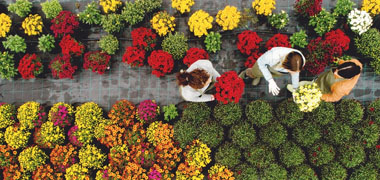
How do I become an Apiarist in Launceston?
Get qualified to work as an Apiarist with a course recognised across Australia. Speak to a training provider to learn more.
Course providers in Launceston
The following providers offer Apiarist courses in Launceston, Tasmania.

Common questions
In Australia, a full time Apiarist generally earns $1,300 per week ($67,600 annual salary) before tax. This is a median figure for full-time employees and should be considered a guide only. As you gain more experience you can expect a potentially higher salary than people who are new to the industry.
 Courses.com.au Team
Courses.com.au Team
The beekeeping industry has seen an increase in employment numbers in recent years. There are currently 1,200 people employed as an Apiarist in Australia compared to 1,000 five years ago. Apiarists may find work across all regions of Australia but are more likely to find job opportunities in rural and regional areas.
Source: Australian Government Labour Market Insights
 Courses.com.au Team
Courses.com.au Team
If you’re planning a career as an Apiarist, consider enrolling in a Certificate III in Beekeeping. This course will show you how to extract honey, use smokers and transport a beehive. You’ll explore topics such as establishing an apiary site, assembling and maintaining a beehive and managing a honey bee swarm.
 Courses.com.au Team
Courses.com.au Team
Related career opportunities
Browse occupations related to Apiarist
Further reading


Careers for people who love the outdoors
14th September 2021
Most popular agriculture courses
8th April 2022Apiarist careers
If you are passionate about beekeeping and interested in pursuing a career in this rewarding field, then you may want to explore the Apiarist courses in Launceston. These courses are designed to equip you with the essential skills and knowledge needed to thrive as an Apiarist. Located in the picturesque city of Launceston, 7250, these training programs are offered by reputable Registered Training Organisations (RTOs) and industry-recognised bodies, ensuring high-quality education and training.
The study of beekeeping within the broader agricultural sector plays a crucial role in promoting biodiversity and sustainable farming practices. The Agriculture courses available in Launceston cover a range of vital topics, including soil health, pest management, and crop production, which are all interconnected with the practices of an Apiarist. By understanding these agricultural concepts, you can better support the health of your bee colonies and enhance their productivity.
Many individuals interested in pursuing a career as an Apiarist may also consider the related field of beekeeping, which is closely linked to the role of an Apiarist. The beekeeping courses focus specifically on the daily management, care, and breeding of bees, ensuring you have a well-rounded understanding of the responsibilities involved. This choice can be particularly beneficial for those who wish to specialise in the health and welfare of bees while also gaining practical, hands-on experience.
Furthermore, the job roles associated with Apiarist training extend beyond beekeeping, offering enriching opportunities in various agricultural domains. Graduates may pursue roles such as a Beekeeper, where they focus directly on hive management and honey production. You can find additional details about this career path within the Beekeeper page, which outlines the skills and qualifications necessary for success in the industry.
